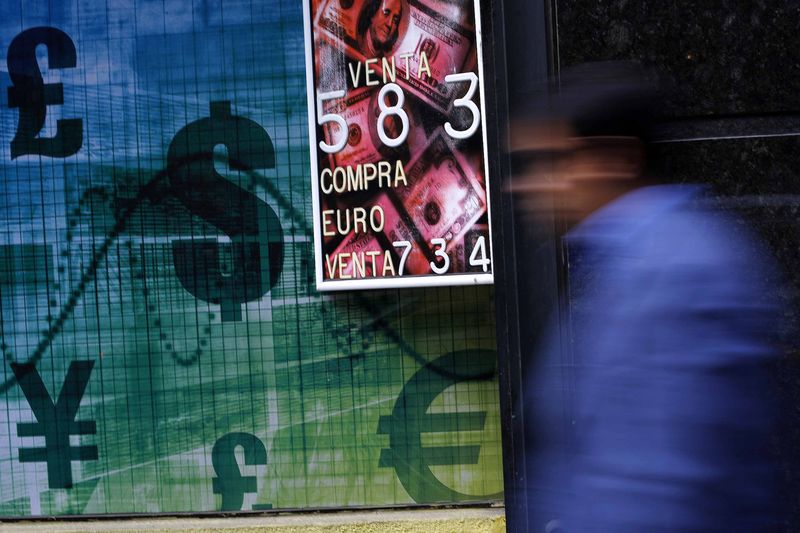* S&P cuts outlook on Australia's rating to negative from stable
* Japanese currency firms, but still shy of post-Brexit highs
* Sterling nurses losses after this week's slide to 31-year lows
* Fed held rates steady to assess Brexit impact, minutes show
TOKYO, July 7 (Reuters) - The Australian dollar withered after Standard and Poor's cut the outlook for that country's credit rating to negative on Thursday, while the safe-haven yen firmed in the fallout from Britain's vote last month to exit the European Union.
The Aussie AUD=D4 fell as low as $0.7467, from an earlier session high of $0.7539, after S&P downgraded the outlook on Australia's AAA credit rating to negative from stable. But the currency pared losses to last buy $0.7507, down 0.1 percent on the day. ratings agency had warned that deadlock on government policy after Saturday's inconclusive elections could endanger Australia's rating over the long run.
A Reuters poll taken ahead of S&P's move showed that analysts had raised their outlooks for the Australian and New Zealand dollars due to those countries' relatively high bond rates and the British pound's recent plunge. euro slipped 0.5 percent to 111.92 yen EURJPY=R , but managed to hold above its Wednesday low of 110.84 and a 3 1/2-year low of 109.30 logged soon after the results of the Brexit referendum were apparent.
The dollar shed 0.4 percent to 100.95 yen JPY= , though it also remained above the previous session's low of 100.20 as well as its June 24 nadir of 99.000 hit after the UK's vote.
"There's a lot of nervousness. Post-Brexit issues are starting to sink in," said Jeff Kravetz, senior investment strategist at the Private Client Reserve at U.S. Bank in Scottsdale, Arizona.
"The yen has been a big story. It keeps strengthening as a safe-haven currency," he said, adding that the dollar might break under 100 yen again against the backdrop of uncertainty.
Sharp yen gains are usually followed by verbal warnings from Japanese financial officials, one of whom said on Wednesday that the finance ministry was closely watching the currency market to see if any speculative factors were behind market moves. to Japan Macro Advisors' probability model of the risk of direct foreign exchange intervention, the dollar's fall to 95 yen could be a trigger point in the next 2 months, while from September onward, the threshold would shift to 90 yen.
"The Japanese yen is appreciating from an extremely weak level and the yen has to appreciate much further before Japan could gain an implicit approval from other G7 countries," said Takuji Okubo, chief economist at Japan Macro Advisors.
"Past episodes of intervention suggest a unilateral intervention without implicit approval from other G7 tends to be ineffective," Okubo said in a note.
Bank of Japan Governor Haruhiko Kuroda said on Thursday that the central bank is ready to expand monetary stimulus further if needed to achieve its 2 percent inflation target, but he made no mention of the Brexit vote that has spread turmoil in financial markets. sterling fell as low as 128.81 yen GBPJPY=R on Wednesday, its lowest since November 2012. It was last down 0.2 percent at 130.70.
The pound had skidded to $1.2798 GBP=D4 in the previous session to log a fresh 31-year low, but was last up 0.1 percent at $1.2939.
Sterling remains under pressure despite the efforts of Bank of England Governor Mark Carney, who has attempted to calm investors roiled by Brexit with an unusually explicit signal that the Bank was poised to pump more stimulus into the economy in the coming months. are still selling into sterling rallies, whenever it rises on any of the crosses," said Kaneo Ogino, director at foreign exchange research firm Global-info Co in Tokyo.
"The BOE might come up with some supportive measures," he said.
The BOE's next interest rate decision will come on July 14, though economists polled by Reuters mostly predicted that the central bank would wait to cut interest rates until its meeting on Aug. 4, when it will likely have a clearer idea about Brexit's impact.
Fanning fears of financial contagion in the wake of the Brexit vote, the number of British property funds suspended in recent weeks doubled to six on Wednesday, leaving 15 billion pounds ($19.37 billion) frozen in the biggest seizing up of investment funds since the 2008 financial crisis. of the U.S. Federal Reserve's June policy meeting released on Wednesday showed that policymakers decided to keep interest rate hikes on hold as they assessed the Brexit impact. dollar was lifted overnight when Institute for Supply Management data revealed that growth in the U.S. economy's service sector increased in June at its fastest pace in seven months. awaited the key U.S. non-farm payrolls numbers due on Friday, which are expected to show employers added 180,000 jobs last month, according to a preliminary Reuters poll. That would follow May's surprisingly weak reading of just 38,000, which some economists expect to be revised upward.
($1 = 0.7743 pounds)
